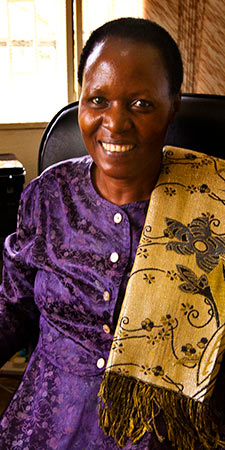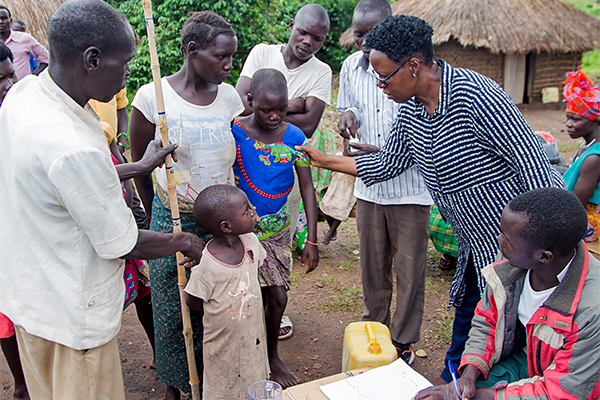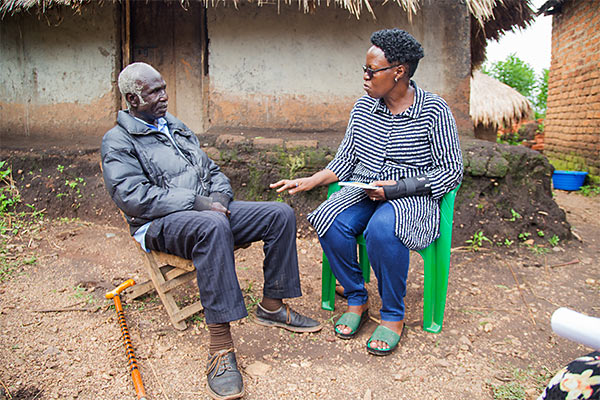
Peace Habomugisha began working for The Carter Center as a social scientist in 1999. She became the Center’s Uganda country director in 2003, supporting the federal Ministry of Health’s River Blindness Elimination Program, one of the first to make complete elimination a national goal. The program succeeds with the support of its partners, including The Carter Center, USAID’s Act to End NTDS | East Program, led by RTI International, the ELMA Foundation, the Lions Clubs of Uganda, Merck and Co., Inc., the Mectizan Donation Program, BASF, Sightsavers, the World Health Organization, and the governments of the Democratic Republic of the Congo and the Republic of South Sudan.
Steven Ocopcan is 77 years old, and he well remembers how river blindness affected his community in Uganda when he was a child.
“At the time, people thought they had annoyed God and, in return, he cursed us,” Ocopcan told me. “Many people sacrificed cows, goats, and hens to God, but this didn’t work. People accused one another of bewitching others. It was bad.”
River blindness, or onchocerciasis, is not a supernatural curse. It is a parasitic disease that causes intense itching, skin rashes, and eye irritation that can lead to permanent blindness. Typically, those infected live near fast-running rivers and streams where black flies breed, bite, and pass on the parasite.

As the Carter Center’s country director in Uganda, Peace Habomugisha typically can be found out in the field, keeping the river blindness program on track. Here she helps measure a child’s height to determine the proper dosage of Mectizan®. This was the last drug administration in the Nyagak-Bondo area of Uganda, as transmission of river blindness has been successfully interrupted in the region.
One such place was Ocopcan’s community in northwest Uganda. It lies within what the River Blindness Elimination Program calls the Nyagak-Bondo focus. Most people in his community, Ocopcan said, had itchy, leopard-spotted and sometimes stretched skin, which made young men and women look old. People from his area were ostracized. Disease-free communities refused to accept for marriage anyone from endemic communities because they were believed to be cursed.
Ocopcan, who still has leopard skin scars on his legs and stomach, led me to a rock on a hill where affected people would scratch their backs for relief. Sufferers also used shards of pottery, dried maize cobs, rough sticks, and rocks to scratch themselves until they bled.

Steven Ocopcan speaks with Habomugisha about the devastating toll river blindness had on his community as a child. (All photos: The Carter Center)
And then one day, everything changed.
“I remember one morning people from Kampala and Nebbi district headquarters came with measuring sticks and boxes of Mectizan®,” Ocopcan told me. “They gave pills to almost everybody. They measured our heights to determine how many tablets we were to take. The tablets were tiny, but very strong. We suffered for some days. Then, the itching stopped.”
Those visitors were officials from the Uganda Ministry of Health. They educated his community about river blindness and its cause and began to train community members to administer the Mectizan to all residents except children less than 5 years old, pregnant women, and those who were very sick. The once-skeptical locals embraced the new solution to the disease because they saw that it worked.
It worked so well that in October 2019, the formerly endemic Nyagak-Bondo focus completed its final mass drug administration (MDA) of Mectizan, having successfully interrupted the transmission of river blindness. This means nearly 600,000 people no longer need to take Mectizan to avoid the disease. It was a joyful day, marked by a community celebration.
As the Carter Center’s Uganda country director, I am thrilled to see communities in my native country freed of this disease. It was once thought that river blindness could not be eliminated in African countries, but this accomplishment shows that it can.
People may think it’s simple to just hand out medication and end the disease, but that’s not the case. I could not do my job without close collaboration with the government of Uganda’s Ministry of Health, district health services, USAID, ELMA, RTI International, Merck, the Lions Clubs, affected communities, and others. Commitment, hard work, and selflessness were the bedrock for the success in the Nyagak-Bondo area.
Ugandans, including me, are grateful to see this disease disappearing. They are thankful for the assistance of The Carter Center and other organizations who offer information and medication to help them get well. On behalf of communities in Uganda who had suffered from this disease for decades, I am thankful.
Related Resources
Please sign up below for important news about the work of The Carter Center and special event invitations.